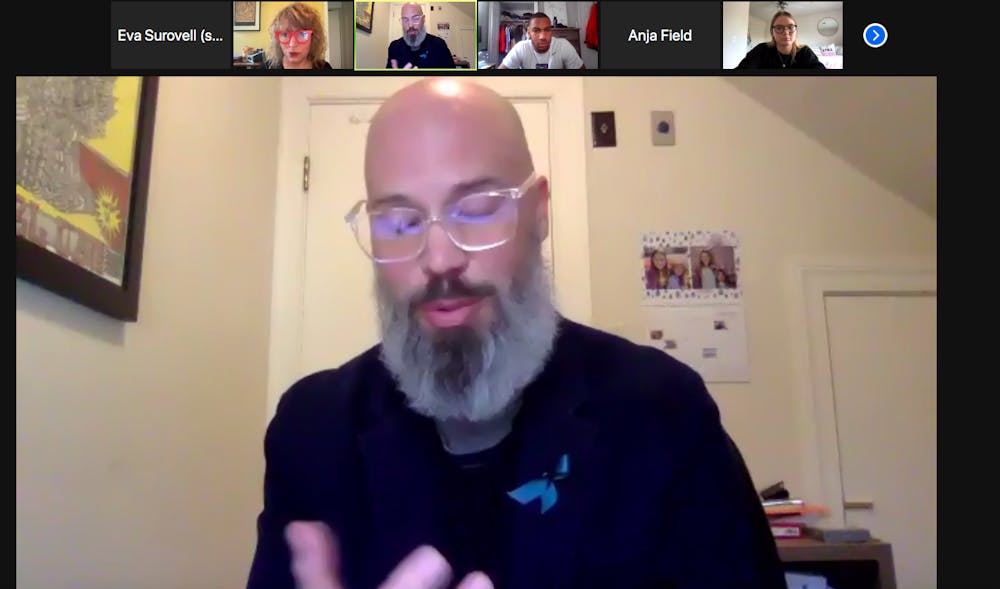As a part of Sexual Assault Awareness Month, Take Back the Night at U.Va. hosted an event centered around promoting healthy masculinity Tuesday night. Panelists discussed personal experiences with toxic masculinity and how to promote a culture of healthy masculinity moving forward. Take Back the Night at U.Va. is a CIO focused on raising awareness about sexual assault and power-based violence.
Learning for Justice defines toxic masculinity as “a narrow and repressive description of manhood, designating manhood as defined by violence, sex, status and aggression.” By comparison, “healthy masculinity” encourages men to seek help when needed and be emotionally vulnerable.
Tuesday’s panelists included senior outside linebacker Charles Snowden, Matthew Ezzell, associate professor of sociology at James Madison University, and Lenny Carter, crisis coordinator for Counseling and Psychological Services. Lisa Spiedel — women, gender and sexuality studies professor — moderated the panel.
To begin the event, Spiedel discussed the importance of masculinity studies as a means of addressing aspects of masculinity that go unnoticed and unexamined in everyday life, which in turn normalizes them.
“We often don't identify ways in which they still may be experiencing pressures and expectations of what gender is,” Spiedel said. “What are we missing by not having this conversation? And what are we missing when we don't create spaces for men to talk about this?”
To start a discussion with the panelists, Spiedel asked everyone to address what healthy masculinity means to them. Ezzell began by discussing how, for him, healthy masculinity means looking for ways to develop emotional subjectivity and emotional vocabulary as well as growing intimate connections with oneself and others.
“Healthy masculinity is really about embracing our fullness of self as members of this human experiment,” Ezzell said.
Snowden added that healthy masculinity is about being comfortable with who you are and not harming others.
Ezzell agreed with Snowden and noted that harming others is often a consequence of toxic masculinity. Ezzell categorized the consequences of toxic masculinity in three dimensions — harm to self, harm to others and harm to other men.
“Often, I think about it through the lens of interpersonal violence, [which] is one of the most direct ways that I have seen that in my own life, and I can even think about the pressure I felt to get in fights as a boy,” Ezzell said.
Snowden reflected on his own experiences growing up playing football, an environment he said felt ridden with examples of toxic masculinity.
“Football is as toxic masculine as it gets,” Snowden said. “It's just so embedded in the culture of football … the whole premise of the game is to dominate the man in front of you.”
When it comes to promoting a culture of healthy masculinity, Snowden said that he tries to take it one conversation at a time by avoiding name-calling and encouraging teammates and friends to go to therapy to talk through their emotions.
“There's no harm in being vulnerable and taking care of yourself,” Snowden said.
Ezzell stressed the importance of listening to and following the leadership of women, gender non-conforming and non-binary indviduals. Specifically, Ezzell noted that if men get called out, it is important to not immediately get defensive — rather, men should try to create a space to listen to what those individuals are saying and think about what it would mean to actually address those concerns.
Ezzell also noted that promoting cultures of healthy masculinity starts in childhood — both through parenting but also through public education.
“One of the things that I think is really crucial is building cultures of consent at very early ages,” Ezzell said. “We often don't realize the lessons surrounding consent and bodily autonomy that we are giving to children at very young ages.”
Carter emphasized that in everyday life, it is important for men to avoid classic communication pitfalls like shutting down in a conflict or delivering the silent treatment as well as behaviors such as excessive sarcasm and put-downs.
“I think about ideally, the willingness to listen, the willingness to compromise, [and] the willingness to continually work on better communication skills,” Carter said.
To wrap up the panel, both Snowden and Ezzell offered a piece of advice to young men. Ezzell began by stressing that the dominant models of manhood that boys see represented in media are not the only ways to behave.
“The models you see, they’re just not good models,” Ezzell said. “But they’re not the only paths.”
Snowden advised boys to stand up for themselves and others and help their male peers whenever possible, even if it makes a situation uncomfortable.
“For me it's just right versus wrong,” Snowden said.
The next Take Back the Night at U.Va. event this week will be a Spoken Word and Prevention Workshop on Wednesday at 6 p.m., followed by the second part of its Title IX and Alternatives to Reporting series on Friday.







